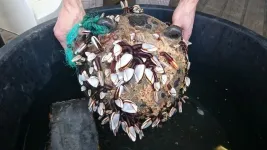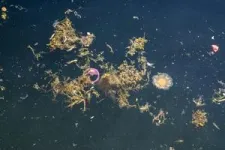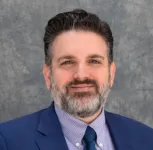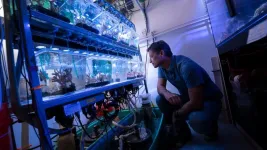(Press-News.org) An international group of scientists has cautioned against reliance on mechanical cleanup devices as a means of addressing the plastic pollution crisis.
The researchers – comprising a number of the world’s foremost experts in plastic pollution – say they appreciate the clear and pressing need to tackle the millions of tonnes of waste that have already accumulated in the ocean and waterways.
However, they caution that plastic removal technologies used so far have shown varied efficiency in the amount of waste material they are able to collect, many have not been tested at all.
In fact, some have been shown to harm quantities of marine organisms – including fish, crustaceans and seaweeds – that far exceed the amount of plastic captured, meaning their overall impact on the ocean is potentially more harmful than helpful.
Writing in the journal One Earth, the scientists say with plastic production projected to triple by 2060 the most cost-effective and efficient way to prevent further pollution is to reduce plastic production and consumption, and for essential applications of plastics to design safe, sustainable products with a readily available and effective pathway for end-of-life disposal.
They also assert that the environmental costs of leaving plastic pollution in the ocean should be weighed against the full environmental and economic cost of plastic removal technologies, and call for clear criteria for such judgments to be incorporated in the United Nations Treaty on Plastic Pollution.
Their commentary has been published as world leaders prepare to resume discussions on the Treaty at the third meeting of the Intergovernmental Negotiating Committee on Plastic Pollution.
Lead author Dr Melanie Bergmann, a marine ecologist at the Alfred Wegener Institute in Germany, said: “So far, we lack hard evidence on the net benefits of plastic removal technologies. On the contrary, there is often bycatch mortality associated with these technologies, which becomes a problem if scaled up. We have to scrutinize these technologies by applying science-based criteria to prevent regrettable outcomes.”
The research highlights that in recent years, several forms of cleanup devices have been developed to remove plastics from the environment.
Sieving vehicles are a common sight on tourist beaches, plastic trapping technologies have been deployed in harbours, and various types of booms, watercraft vehicles, bubble curtains, or receptacles have been positioned across rivers and estuaries.
In addition, there are innovations for the open ocean and the seabed that use combinations of towed nets, autonomous vessels and artificial intelligence.
However, the authors of the current paper say that even if these technologies were to show signs of being truly effective, they would barely scratch the surface of the global problem. Cleanup practices could also lead to greenwashing through new "plastic credit" schemes to offset the emissions of plastics through the indiscriminate use of unselective and harmful plastic removal technologies.
As a result, the international group is concerned that focusing too greatly on cleanup approaches will create more environmental risk, and be a distraction from the key priorities of the Plastic Treaty negotiations: Plastic pollution prevention.
ADDITIONAL QUOTES FROM STUDY CO-AUTHORS
The research was co-authored by scientists from: Alfred Wegener Institute, Helmholtz Centre for Polar and Marine Research (Germany); Norwegian Geotechnical Institute, Norwegian University of Science and Technology (Norway); University of Gothenburg, Stockholm University (Sweden); Moore Institute for Plastic Pollution Research, Gyres Institute; Earth Commons Institute, Georgetown University (USA); Aarhus University, Roskilde University (Denmark); Cukurova University, Özyeğin University (Turkey); University of Plymouth (UK); Manipal Academy of Higher Education (India); Massey University (New Zealand).
Professor Bethanie Carney Almroth, University of Gothenburg: “The planet is facing a triple planetary crisis of climate, biodiversity loss and pollution, all three of which are interconnected. Our actions need to be driven by an understanding of systemic consequences; we need to evaluate the impact of existing plastics pollution on biodiversity, but we also need to understand the impacts of cleanup technologies. We must find the best paths forward to prevent harm and protect the environment.”
Dr Hans Peter Arp, Norwegian University of Science and Technology: “The discussions regarding the UN Treaty on Plastic Pollution should focus on lowering the dependence and production of virgin plastic materials, particularly from fossil fuels, and towards zero waste. If the discussions instead focus on creating plastic offset schemes based on plastic removal technologies to offset waste and emissions, the treaty will not be effective at slowing this global crisis.“
Dr Sedat Gündoğdu, Cukurova University: “Plastic pollution is on the edge of irreversibility, and this pollution is not at a level that can be eliminated by expensive and limited cleanup technologies whose effectiveness has not been scientifically proven. Moreover, such activities pose a risk to biodiversity. Therefore, a more appropriate method in all respects would be to turn off the tap. The UN Treaty on Plastic Pollution should also bear this in mind.”
Dr Rebecca R. Helm, Georgetown University: "Research from my lab shows that cleanup technology may endanger local ecosystems even in the open ocean. Plastic pollution is dangerous for the environment because it disrupts normal environmental processes. But cleanup technologies only add to this disruption. We need ecologically safe and sound solutions, and we need them upstream. Once plastic is in the environment, it’s hard to remove without doing more damage.“
Professor Richard Thompson OBE, University of Plymouth, said: “Our research has shown that cleanup technology can harm marine life and be ineffective at actually cleaning If we focus on cleanup as a solution to plastic pollution we condemn future generations to continue contaminating the environment and cleaning up as an afterthought. The UN Treaty on Plastic Pollution needs systemic upstream solutions focused on prevention, not symptom management.“
END
Scientists caution against a reliance on mechanical devices to clear water bodies of plastic
2023-11-09
ELSE PRESS RELEASES FROM THIS DATE:
UTSA’s Jessica Eise wins funding to advance climate science advocacy research
2023-11-09
(San Antonio, November 9, 2023) — The National Science Foundation (NSF) has awarded Jessica Eise, an assistant professor of social and environmental challenges in the University of Texas at San Antonio Department of Communication, $425,000 for her project to explore how to create enduring change in environmental public behavior to support actions that will effectively address climate change and its impacts on society.
Despite four decades of climate change communication, the world has yet to see adequate public action and policymaker support to substantively address the challenge. Eise’s findings will empower ...
Women produce skin temperature data that are just as predictable as men
2023-11-09
Women produce physiological data that is just as predictable as men, at least when it comes to skin temperature. This might seem like common sense, but variations in body signals due to menstrual cycles, such as temperature, were used as an excuse to keep women out of clinical studies for decades.
The data for the finding was gathered from a wearable device to continuously monitor the skin temperature of 600 people, half female and half male, over six months.
The team found that there were more differences between any ...
Vanderbilt and Duke awarded Moore Foundation grant to improve oversight of AI technology in health care systems
2023-11-09
Vanderbilt University Medical Center (VUMC) and Duke University School of Medicine have been awarded a $1.25 million grant from the Gordon and Betty Moore Foundation for the project “Measuring Artificial Intelligence (AI) Maturity in Healthcare Organizations.”
Working with the Coalition for Health AI (CHAI) and the University of Iowa, a team of experts will leverage the grant to develop a maturity model framework. The project leads are Peter Embí, MD, MS, and Laurie Novak, ...
Doctoral degrees without borders
2023-11-09
Doctoral students at nine New York City area graduate engineering programs will soon be able to take courses at each other’s institutions without any additional tuition, as part of a new multi-school agreement announced today.
The Inter-University Engineering Doctoral Consortium (IUEDC), led by NYU Tandon School of Engineering, encourages Ph.D. students to complement their primary program by taking courses of interest offered at different schools, providing access to specialty instruction and expertise that may not be available at their home universities. Students should be ...
Scientists find 14 new transient objects in space by peering through the 'Christmas Tree Galaxy Cluster'
2023-11-09
An international team of scientists, led by University of Missouri’s Haojing Yan, used NASA’s James Webb Space Telescope (JWST) to discover 14 new transient objects during their time-lapse study of galaxy cluster MACS0416 — located about 4.3 billion light years from Earth — which they’ve dubbed as the “Christmas Tree Galaxy Cluster.”
“Transients are objects in space, like individual stars, that appear to suddenly brighten by orders of magnitudes and then fade away,” said Yan, an associate professor in the Department ...
2023 AAAS Kavli Science Journalism Award winners named
2023-11-09
Stories about troubling aspects of science’s past as well as some hopeful signs for its future are among the winners of the 2023 AAAS Kavli Science Journalism Awards.
Presenter Adam Rutherford and producer Ilan Goodman won a Gold Award in the Audio category for a BBC series on the eugenics movement and its continuing repercussions in the modern age. Ashley Smart of Undark magazine won the Gold Award in the Science Reporting In-Depth category for a piece on the lingering impact of scientific racism, including the appropriation of legitimate genetics research for extremist ends.
On a more ...
Regenstrief experts will address national, global challenges at AMIA symposium
2023-11-09
INDIANAPOLIS -- Regenstrief Institute informaticians and other data experts will share their research insights and innovations from November 11-15 at the 2023 American Medical Informatics Association (AMIA) Annual Symposium in New Orleans, Louisiana.
Two Regenstrief researchers also were part of the leadership team that organized and helped set the agenda for the conference, “Transforming Healthcare and Biomedicine for a Sustainable Future.”
AMIA’s Annual Symposium is the premier medical informatics event, presenting leading-edge scientific research and a wide array of scientific sessions. The symposium presents work from across the spectrum of the informatics ...
Early life exposure to broccoli sprouts protects against colitis in inflammatory bowel disease
2023-11-09
Washington, D.C.—High fiber diets, like those that include broccoli sprouts or other cruciferous vegetables, may reduce disease symptoms and improve quality of life in patients with inflammatory bowel disease (IBD), according to a study conducted in mice. The study was published in mSystems, a journal of the American Society for Microbiology.
In the study, the investigators used a popular interleukin-10-knockout (IL-10-KO) mouse model of Crohn’s to investigate the interactions between mice and their immune systems, as well as the broccoli ...
The Paul G. Allen Frontiers Group announces Allen Discovery Center for Neuroimmune Interactions at Icahn School of Medicine at Mount Sinai
2023-11-09
SEATTLE, W.A.—November 9, 2023—The Paul G. Allen Frontiers Group, a division of the Allen Institute, today announced the launch of the Allen Discovery Center (ADC) for Neuroimmune Interactions at the Icahn School of Medicine at Mount Sinai. The research team will comprehensively define and map the interactions between the nervous system and the immune system that take place distant from the brain, such as at the skin, lung, and gut surfaces, and analyze how these interactions relay a variety of sensations back to the brain and regulate organ physiology and tissue immune responses.
"Understanding ...
Lei Shi elected as a member of the STM Board
2023-11-09
On 16 October 2023, the newly elected STM Board Members were announced at the Annual General Meeting. Lei Shi, the Deputy Editor-in-Chief of Tsinghua University Press (TUP), and the Director of both the Journal Publishing Center and Academic Publishing Center of TUP has been elected to the designated seat representing non-Europe/US based companies. He became the first Chinese representative on the STM Board.
STM is the world’s leading association of scholarly publishers, who is committed to advance trusted research for ...







